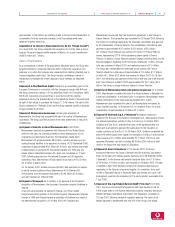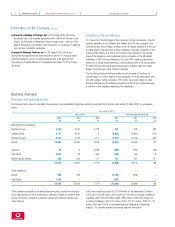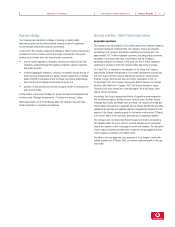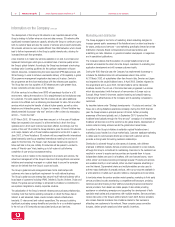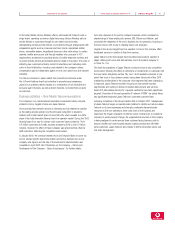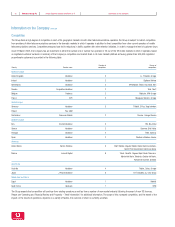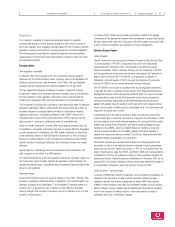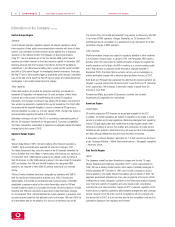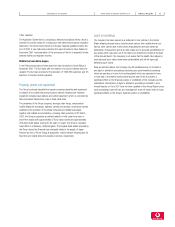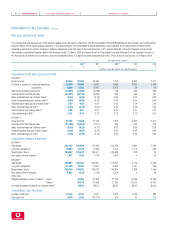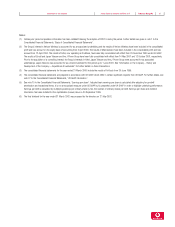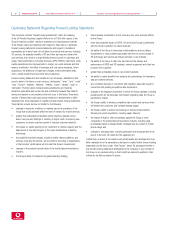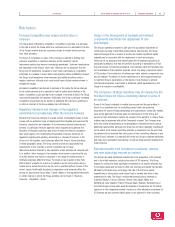Vodafone 2002 Annual Report Download - page 21
Download and view the complete annual report
Please find page 21 of the 2002 Vodafone annual report below. You can navigate through the pages in the report by either clicking on the pages listed below, or by using the keyword search tool below to find specific information within the annual report.
Information on the Company Vodafone Group Plc 19Annual Report & Accounts and Form 20-F
a GSM licence in Albania and further GSM spectrum in Greece. Vodafone expects
to participate in additional 3G licence allocation procedures in other jurisdictions
in which it operates. No assurances can be given that the Group will be
successful in obtaining any 3G licences for which it intends to apply or bid.
The construction of 3G network infrastructure has already commenced. During
the 2002 financial year, tangible capital expenditure on 3G network infrastructure
amounted to less than 10% of total tangible capital expenditure. The Group
presently expects to incur expenditure on 3G network infrastructure of
approximately £1.8 billion in the 2003 financial year. This expenditure is
expected to be financed through operating cash flows and existing borrowing
facilities. The Group has entered into contracts with four key suppliers for the
delivery of 3G network infrastructure.
Further details on the Group’s 3G plans can be found in “Strategic developments
– Products and services”below.
Strategic developments – Products and services
The Group’s vision is to be the world’s mobile communications leader –
enriching customers’ lives, helping individuals, businesses and communities be
more connected in a mobile world. Its global strategy is to provide mobile voice,
messaging, business, information and entertainment services to its global
customer base. One of the ways in which it achieves its strategic objectives is by
developing and enabling others to develop a diverse range of compelling services
for customers. A comprehensive product and application roadmap governs the
development of new services, and the introduction of new network enabling
capabilities, which are designed to converge into a highly integrated customer
experience.
During the 2002 financial year, a number of significant milestones were achieved
which underpin the Group’s overall strategy for the development of voice and
data-related applications. New voice services, including Eurocall, Virtual Home
Environment, assisted roaming and prepaid roaming, were all successfully
introduced, enabling the Group to both gain new customers in key market
segments and achieve incremental revenue growth from existing customers.
The rollout of the single Vodafone brand has been significantly progressed during
the year, with fourteen Group subsidiaries now operating as “Vodafone”.
Subsidiaries in Italy and Japan currently running with dual brand names are
expected to migrate to the single Vodafone brand within the next year. With most
of the Group now operating as “Vodafone”, it is important that the Group
generates and enhances global awareness of the single brand and its values.
Accordingly, during the year, Vodafone’s first ever global advertising campaign,
“How are you?”, was successfully launched in most of the single branded
markets. This included advertising campaigns designed to support the Group’s
global product strategy, targeted particularly at high value business roaming
customers. To drive global brand awareness further, the Company became a
principal sponsor of the Ferrari Formula One motor racing team. The Ferrari
sponsorship supports our brand positioning and serves as a communications
platform for increasing usage of services. It also serves as a strong focal point
for internal staff programmes.
The strength of the Vodafone brand has led to partner agreements with two
networks, Radiolinja, the leading private mobile operator in Finland, and
Teledanmark, the leading Danish integrated operator. Under the terms of these
agreements, the partner networks promote Vodafone roaming services under
a dual brand to their international travellers and corporate customers.
Vodafone customers will also recognise Radiolinja and Teledanmark as trusted
partners and will enjoy from them services with the same look and feel that they
already receive from other Vodafone networks across Europe. The agreements
also extend the Group’s global footprint without equity investment and prove the
remarkable strength of the brand as well as the global service set.
With GPRS networks (or their equivalent) now open for service in all the Group’s
major markets, providing an enhanced foundation for a variety of additional
services previously unavailable to customers, the Group’s focus will continue to
be the rolling-out of compelling applications to appeal to its global customer
base. In March 2002, the Group became the first mobile operator to offer a
commercial GPRS data roaming service across twelve European countries.
Products now being offered by the Group include innovations such as location
based services which have been developed as a Group-wide standard. In
Germany, the location based service allows customers to, access, for example,
information about nightlife in their current location and has been recognised as
being the best new location based service in Germany. In other parts of the
Group, location based services are also being marketed as fleet management
tools. New SMS-based services are now available, such as “Mplay”in Italy,
offering improved “chat”and “games”functionality, with others planned for future
launch following the signing of agreements with selected partners to provide
premium content services via SMS. Other services also include mobile payment
facilities, including credit card authorisation functionality, unified messaging,
which has been launched in six European countries to date, and more generic
services to allow customers to access the internet either through their handset,
PDA or laptop computer.
For the corporate customer, the Group offers services that provide mobile access
to corporate intranets and office-based applications at speeds typically faster
than those available through standard fixed telephone lines. In the UK, Office Live
promotes remote PDA based access to corporate e-mail and in America, Verizon
Wireless is currently conducting trials of its next generation services which allow
more secure and faster access to corporate intranets. Similar services, targeted
specifically at business users, are also available in other Group networks.
Over the course of the next few months, the Group intends to build upon these
new products and services by offering an extended range of applications to
customers. This will include picture messaging and the availability of camera-
phones in the Group’s European markets, building on the success of
J-Phone Vodafone’s “sha-mail”service in Japan and camera-phones. Vodafone
in Germany and Portugal are already offering initial picture messaging phones.
Vizzavi Europe Ltd is the Group’s 50%-owned joint venture with Vivendi
Universal, and has been created to develop premium content such as ringtones,
logos, games and other downloads for the Group’s mobile customer base.
In January 2002, a revised business and operational model was agreed, focusing
on content services for the mobile customer base with a view to increasing
customer usage and revenue. At 31 March 2002, Vizzavi’s registered user base
was 7.5 million, compared with 0.7 million at 31 March 2001. The creation of
new services and applications will also be supported by the Group’s global
developer programme, “Via Vodafone”, which provides the framework for
developers to create mobile applications and market them to the Group’s
customer base using web-based interfaces providing access to the core
network services.


